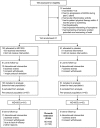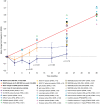MD1003 (high-dose biotin) for the treatment of progressive multiple sclerosis: A randomised, double-blind, placebo-controlled study
- PMID: 27589059
- PMCID: PMC5098693
- DOI: 10.1177/1352458516667568
MD1003 (high-dose biotin) for the treatment of progressive multiple sclerosis: A randomised, double-blind, placebo-controlled study
Abstract
Background: Treatment with MD1003 (high-dose biotin) showed promising results in progressive multiple sclerosis (MS) in a pilot open-label study.
Objective: To confirm the efficacy and safety of MD1003 in progressive MS in a double-blind, placebo-controlled study.
Methods: Patients (n = 154) with a baseline Expanded Disability Status Scale (EDSS) score of 4.5-7 and evidence of disease worsening within the previous 2 years were randomised to 12-month MD1003 (100 mg biotin) or placebo thrice daily, followed by 12-month MD1003 for all patients. The primary endpoint was the proportion of patients with disability reversal at month 9, confirmed at month 12, defined as an EDSS decrease of ⩾1 point (⩾0.5 for EDSS 6-7) or a ⩾20% decrease in timed 25-foot walk time compared with the best baseline among screening or randomisation visits.
Results: A total of 13 (12.6%) MD1003-treated patients achieved the primary endpoint versus none of the placebo-treated patients (p = 0.005). MD1003 treatment also reduced EDSS progression and improved clinical impression of change compared with placebo. Efficacy was maintained over follow-up, and the safety profile of MD1003 was similar to that of placebo.
Conclusion: MD1003 achieves sustained reversal of MS-related disability in a subset of patients with progressive MS and is well tolerated.
Keywords: MD1003; Multiple sclerosis; clinical trial; disability progression; high-dose biotin; primary progressive multiple sclerosis; secondary progressive multiple sclerosis.
© The Author(s), 2016.
Conflict of interest statement
Declaration of Conflicting Interests: The author(s) declared the following potential conflicts of interest with respect to the research, authorship and/or publication of this article: Prof. Ayman Tourbah has received consulting fees, travel grants and reports institutional financial compensation for patient visits during the trial from MedDay Pharmaceuticals and consulting and lecturing fees, travel grants and research support from Biogen Idec, Sanofi-Genzyme, Novartis, Merck Serono, Teva Pharmaceuticals and Roche. Prof. Gilles Edan reports personal fees from Biogen Idec and Novartis and grants and personal fees from Merck Serono, Teva, Sanofi and Bayer, outside the submitted work. Prof. Sandra Vukusic reports clinical trial support from MedDay Pharmaceuticals, Biogen Idec, Merck Serono, Novartis, Roche, Sanofi-Aventis, Teva Pharmaceuticals and Genzyme; advisory or consultancy fees from Biogen Idec, Genzyme, Merck Serono, Novartis, Roche, Sanofi-Aventis and Teva Pharmaceuticals; and invited congress support from Biogen Idec, Merck Serono, Novartis and Genzyme. Prof. Jérôme De Sèze reports clinical trial support from MedDay Pharmaceuticals, Biogen Idec, Merck Serono, Bayer, LFB, UCB, AB Sciences, Sanofi-Aventis, Teva Pharmaceuticals and Genzyme; advisory or consultancy fees from Biogen Idec, Merck Serono, Bayer, LFB, Sanofi-Aventis, Teva Pharmaceuticals, Almirall and Allergan; and invited congress support from Biogen Idec, Merck Serono, Bayer, LFB, Sanofi-Aventis, Teva Pharmaceuticals, Genzyme and Allergan. Dr Olivier Gout reports personal fees and non-financial support from Biogen Idec, Teva Pharmaceuticals, Genzyme and Novartis and personal fees from Merck, outside the submitted work. Prof. Gilles Defer reports personal fees from Biogen Idec, Novartis, Sanofi-Aventis, Genzyme and Teva Pharmaceuticals; grants from Novartis, Merck Serono and Teva Pharmaceuticals; and funding for travel from Merck Serono, Biogen Idec, Guerbet, Sanofi-Aventis, Novartis, Genzyme and Teva Pharmaceuticals, outside the submitted work. Prof. David-Axel Laplaud reports personal fees from Biogen and Teva Pharmaceuticals and grants and personal fees from Novartis and Genzyme, outside the submitted work. Prof. Thibault Moreau reports personal fees and non-financial support from Biogen, Novartis, Sanofi-Genzyme, Bayer, Merck, Teva Pharmaceuticals and Almirall, outside the submitted work. Prof. Bruno Brochet received grants from MedDay Pharmaceuticals during the conduct of the study; personal fees and non-financial support from Biogen Idec, Novartis and Genzyme; grants from Merck Serono; grants, personal fees and non-financial support from Teva Pharmaceuticals; and grants and non-financial support from Bayer, outside the submitted work. Dr Frédéric Sedel is CEO and a shareholder at MedDay Pharmaceuticals (the study sponsor). Prof. Jean Pelletier has received consulting and lecturing fees, travel grants and unconditional research support from Biogen Idec, Sanofi-Genzyme, Novartis, Merck Serono and Teva Pharmaceuticals. Dr Christine Lebrun-Frenay, Prof. Michel Clanet, Dr Caroline Papeix, Prof. Marc Debouverie, Prof. Pierre Clavelou and Prof. Pierre Labauge have nothing to disclose.
Figures



Comment in
-
Biotin in progressive multiple sclerosis: A new lead?Mult Scler. 2016 Nov;22(13):1640-1641. doi: 10.1177/1352458516676387. Mult Scler. 2016. PMID: 27815562 No abstract available.
-
Reply to Letter to the Editor: Biotin supplementation in MS clinically valuable but can alter multiple blood test results by Siddiqui U, et al.Mult Scler. 2017 Apr;23(4):620-621. doi: 10.1177/1352458516680752. Epub 2016 Dec 7. Mult Scler. 2017. PMID: 27899553 No abstract available.
-
Biotin supplementation in MS clinically valuable but can alter multiple blood test results.Mult Scler. 2017 Apr;23(4):619-620. doi: 10.1177/1352458516680751. Epub 2016 Dec 7. Mult Scler. 2017. PMID: 27899554 No abstract available.
-
Biotinidase deficiency masquerading as multiple sclerosis?Mult Scler. 2018 Feb;24(2):237-238. doi: 10.1177/1352458517702551. Epub 2017 Mar 24. Mult Scler. 2018. PMID: 28337933 No abstract available.
-
Reply to the letter: Biotinidase deficiency masquerading as multiple sclerosis?Mult Scler. 2018 Feb;24(2):239. doi: 10.1177/1352458517702554. Epub 2017 Mar 24. Mult Scler. 2018. PMID: 28337934 No abstract available.
References
Publication types
MeSH terms
Substances
Associated data
Grants and funding
LinkOut - more resources
Full Text Sources
Other Literature Sources
Medical

